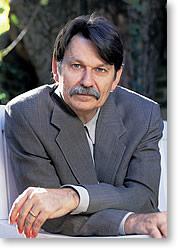 |
| Ginger Murchison interviewing Stephen Dobyns |
Having had the opportunity, and distinct pleasure to study on two occasions with Stephen Dobyns, I've found this concept, quoted here from an interview he did with editor Ginger Murchison in the Spring 2004 issue of The Cortland Review (TCR), most helpful in my own writing (in bold italics below):
TCR: I remember reading an Edward Leuders poem to my high-school students that defined poetry as "blue taillights on Tyranosaurus Rex." They enjoyed thinking about poetry that way, and it was just as you said—an exaggerated reality of poetry. Given that Concurring Beasts might have its exaggerations, it clearly works from both sides of the page, from poet to reader, and I'm going to ask you, if you will, to read the last five lines of the final poem. I should ask you to read the whole poem, but it's especially the last five lines I want to focus on. Would you do that?Full TCR Interview
Stephen Dobyns: Sure. It's from a poem called "The Ways of Keys."
Let a dark lantern be placed in the circleTCR: There's a lyric moment for you, for the poem and for a young poet's first book. Already, at that point in your life, you had developed a clear position about the responsibility of a poet and a sense of control.
And let me lie down by it, becoming
both entrance and exit of light. Let me
be the door and the lock. Let me
learn the ways of keys.
Stephen Dobyns: Exactly. The poem talks about trying to translate the world into language to make it understandable and so to make it endurable, to make it seem less random, and to make the speaker of the poem seem not so much a victim within the world, but to have some control simply by being able to turn the world into language and ideally then open to some greater understanding.
TCR: ...and you aren't just saying—as the poet—that you want the keys for yourself. You are actually handing them to the reader...a gift.
Stephen Dobyns: Right. The speaker here wants to become both the entrance and the exit of light, to have it pass through him.
 |
| Gregory Orr |
Gregory Orr says it lyrically in one of my favorite poems, available at poets.org:
Orr says poems translate experience of disorder as patterned language, the most ordered form of language, or as Emily Dickenson wrote: “After great pain a formal feeling comes.”
Some Part of the Lyric by Gregory Orr
Given my own experience with grief and loss, both personally, and in the course of my professional work, I've found poetry to be a great container for the chaos of life. Here's a poem from my chapbook, Flying for the Window (Finishing Line Press, 2008), that deals with the loss of my son to cancer, first published in The Boston Literary Magazine:
WHAT I WEAR
This world above worlds is a prairie
of clouds and sun glare.
Below, the smoldering hearths
shed smoke like irradiated hair.
Worth less than his breath
on earth, his song plays in my ear.
Still, I listen. I listen again
for clues, the gift of his verse.
I grow tired, await
the terrible fates.
You see me wear
this blue plaid shirt,
the one he gave me last year.
I play his red guitar.
My son also knew the power of words. We found this journal entry dated April 2004, written a year and a half before he died, while he was in the midst of treatment for his cancer:
 |
| Charlie Coté, Jr (1987 - 2005) |
UNFAMILIAR SKY
Look up, it just might surprise you.Here's a link to him singing the first five lines in a Fivestar Riot song by the same name:
I think we've found your cure.
Don't know where we're going-
doesn't matter,
why do we need to be so sure?
Where we're going- it's a better place,
but I can't say for sure.
Either way, don't we know it's
for the better? And there's no need
to feel so insecure.
The cure is the disease
that brings everyone around you
caring for what they don't understand,
helping with the load that's just too heavy
to carry alone.
It's like a coffin,
we're all on a handle.
The second it drops is the one
we all fall down.
Find more artists like Fivestar Riot at Myspace Music
Gregory Orr says that poetry saved his life. When he was a child, he accidentally shot and killed his younger brother in a hunting accident. He discovered poetry while in high school and it gave him a way to create some order out of that chaos. He's written a book called Poetry as Survival that explores this idea in great depth. He's also written a powerful memoir called The Blessing.
Dobyns has written what I consider to be one of the best collection of essays on writing poetry: Best Words, Best Order.
1 comment:
Stephen Dobyns: The Great (Allusion)ist. Read it now at http://wp.me/pC3Xj-pG
Post a Comment